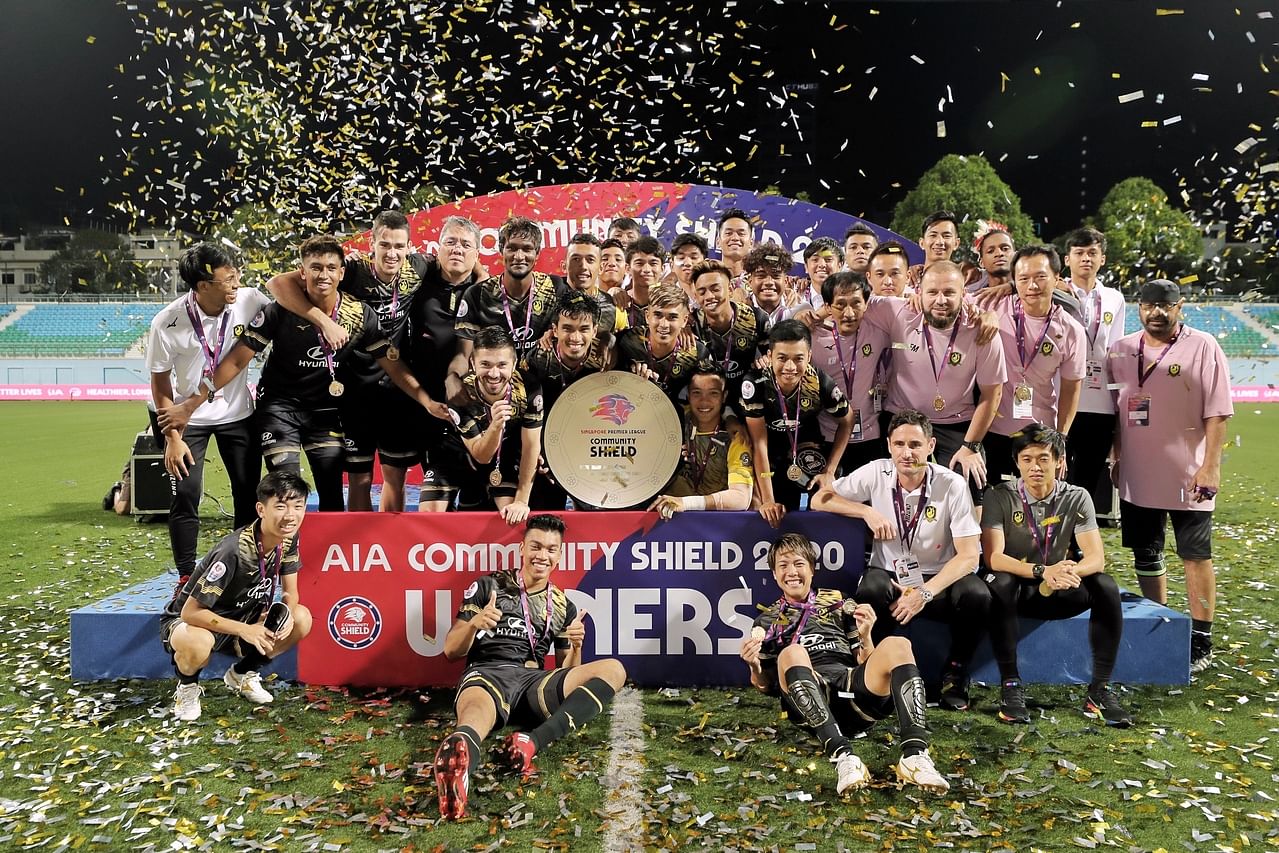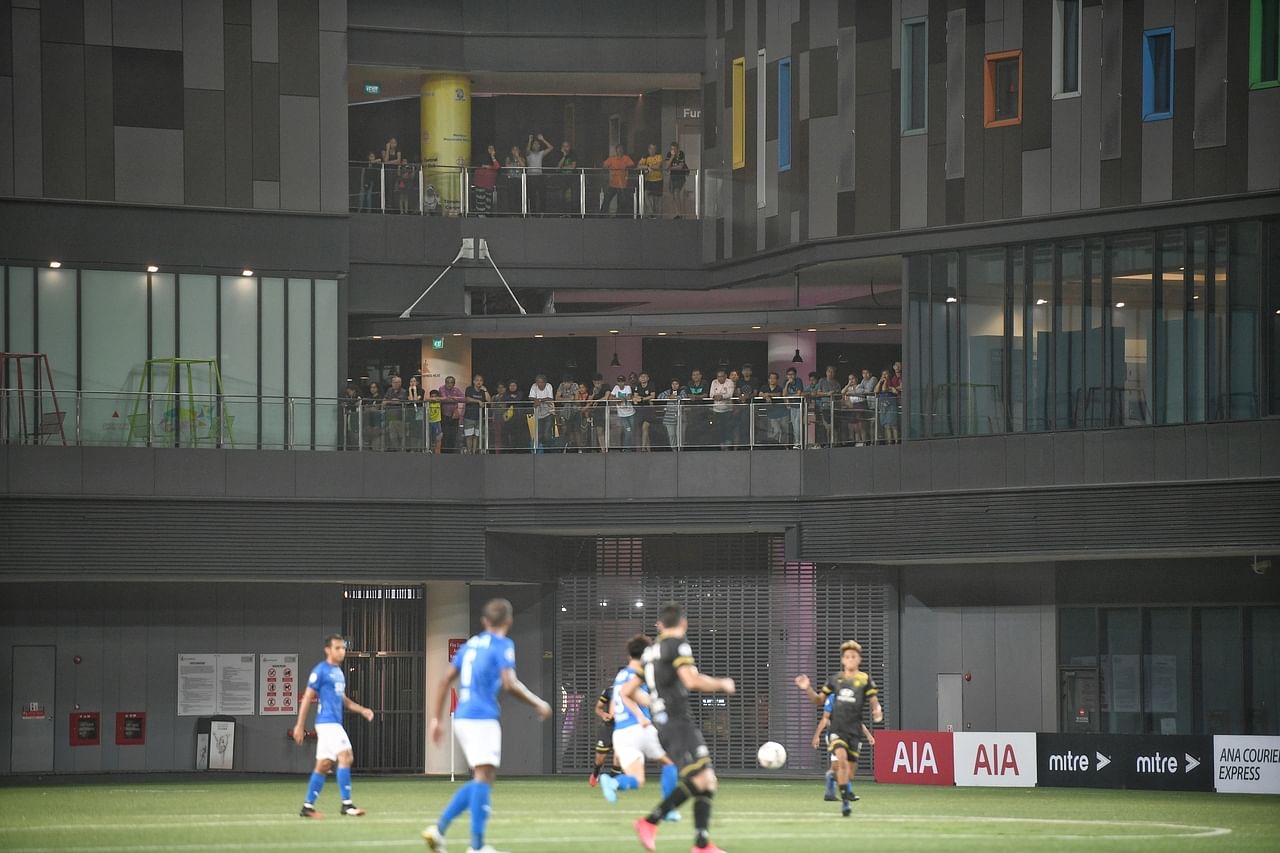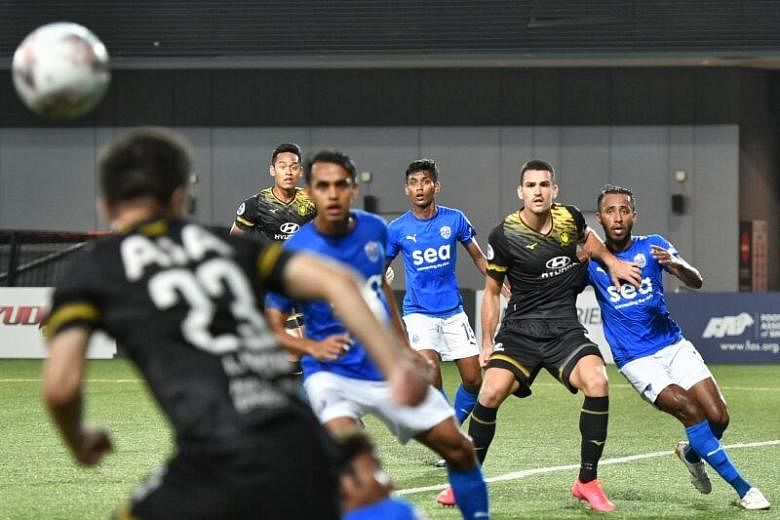SINGAPORE - Kits are being dug out of the closet, boots are dusted off, and some shinpads might even be shined.
After over two months of being limited to Zoom workouts and lonely jogs around their neighbourhoods because of the coronavirus pandemic, players in the AIA Singapore Premier League (SPL) are still waiting to learn when they are able to trod on the turf and have a ball at their feet again.
"What I miss most," said Hougang United midfielder M. Anumanthan, "is the competitive nature of the game.
"In training, even possession drills and (the game of) 'monkey', which are done in groups, challenge you to be better.
"All those Zoom individual workouts are good, but there's nothing that compares to being out on the pitch and training with the ball."
Singapore moved into Phase 1 of the post-circuit breaker period last Tuesday, and national sports agency Sport Singapore (SportSG) announced that Olympic-bound athletes were permitted to resume training under "controlled conditions", which include safe distancing, temperature taking and contact tracing procedures.
While players and coaches The Straits Times spoke to said they have not been informed by their respective clubs of a restart date for the SPL, sports facilities are expected to reopen in the second phase of the easing of restrictions, and Singapore's only professional sports league could resume games next month.
The SPL was officially suspended on March 24, four days after the last game played (a 2-2 draw between Tanjong Pagar United and Albirex Niigata).
However, some unfamiliar conditions will greet the players and staff of the nine SPL teams when they return to work. ST looks at some of these circumstances.
RESCHEDULING THE LEAGUE
The 2020 season SPL was originally scheduled to be completed on Sept 20, after which the Komoco Singapore Cup would take place.
The Cup competition was slated to end before November, so the national team could adequately prepare for the biennial Asean Football Federation (AFF) Suzuki Cup scheduled for Nov 23 to Dec 31.
An AFF spokesman told ST on Wednesday the tournament is on track to take place, and this means there will be a tight window for domestic football to be concluded, which could force leagues to make changes.
For instance leagues in Indonesia, Malaysia and Thailand will begin playing only in September. While Indonesia is still weighing changes to its format, Malaysia has decided to scrap its home-and-away format, playing just 11 rounds of games in total down from the original 22. Thailand, meanwhile, will extend its season until May 2021.
Most SPL sides have played only three rounds of matches, with 24 rounds scheduled this season. Defending champions Brunei DPMM have played just one game, owing to travel restrictions that meant they were not able to travel to Singapore for games.
FAS president Lim Kia Tong told ST that the national football body has been in meetings with SportSG about protocol requirements for the restart of the league. It has also kept in touch with SPL clubs throughout the circuit breaker period.
Added Lim: "While the FAS has contingency plans to navigate towards an adequate completion of the 2020 domestic football calendar, especially in view of the year-end AFF Suzuki Cup, the fluid nature of the current Covid-19 situation and the national safety measures in place requires us to continue taking guidance from the relevant government agencies."
But while many leagues face commercial pressures to complete their seasons, former national player R. Sasikumar, who founded sports marketing agency Red Card Global after hanging up his boots, said the FAS has the flexibility to come up with different contingencies because it is not beholden to pressures from corporate stakeholders.
A source told ST that the SPL's current broadcast deals, for example, are limited to agreements with SingTel and StarHub as content carriers, which do not involve any financial outlay.
"Unlike the English Premier League (EPL), which is a global brand whereby a cancellation would affect various sponsors and broadcasters all over the world, our situation is very straightforward," said Sasi.
"In the SPL's case, there are mainly three parties that will decide the next step - the FAS, SportSG and the Tote Board (which provides funding for the league).
"It's a very top-down approach, and I don't see the SPL under pressure to make any difficult decisions... it just has to take the cue from the authorities."
He added that this flexibility would even allow the FAS to make significant changes to the domestic football competitions, such as reducing the number of SPL games and rescheduling the Singapore Cup.
CHAMPS IN LIMBO?
There are question marks over Brunei DPMM's continued participation this season, with the club yet to play a game in Singapore this year.
Both countries closed their borders on March 24.

Then there is the issue of quarantine, with both countries requiring visitors to undergo 14 days of quarantine. Given the home and away nature of professional football, it is difficult to see how the six local clubs and Albirex Niigata will be able to execute their fixtures against DPMM with ease.
The only fixture DPMM have played this year was on March 6, when Tampines travelled to Bandar Seri Begawan and lost 2-0. The Bruneians pulled out of the Feb 22 Community Shield with Tampines Rovers, and the Feb 29 SPL game against Lion City Sailors, citing "precautionary travel restrictions".
Brunei, which has recorded 141 cases of Covid-19, resulting in two deaths, has been easing its social distancing measures progressively since May 4. It has not reported an infection since May 7.
When contacted, DPMM head coach Adrian Pennock said: "We're still not training yet, and the management of the club is waiting on the Brunei Health Ministry to give us permission to.
"We've had 29 days without an infection here, and I'm hoping (getting back to training) will happen any day now... The country is opening up but very slowly.
"It's good we're talking about getting back to action, but the situation is in the hands of the health ministries in Singapore and Brunei."
Japanese outfit Albirex, the other invited foreign team in the SPL, do not face any issues with resuming participation as all the players have remained in Singapore since the suspension of the league.
RESTARTING THE ENGINE
Last month, some SPL coaches told ST that their players would require between four and six weeks of training to get into shape for competitive football.
They are unlikely to get the luxury of a six-week run up, although Lim said the FAS would take into account "the need to provide clubs with adequate time" for players to be physically ready.
Tanjong Pagar United captain Faritz Hameed said: "Most players are still fit because we kept our physical fitness up during the circuit breaker period, but we are not match-fit yet. Running and playing the game are two different things."
The International Football Association Board - which is responsible for the laws of the game - last month made a temporary amendment to football's laws to allow five substitutions per game, up from three, in a bid to help teams returning to club football cope with the possibility of playing frequently in a short space of time.
For instance, the Italian Serie A, which is set to resume on June 20, is likely to see teams play twice weekly in a bid to finish the season by early August.
Most of the top European leagues that are resuming competition after the coronavirus-enforced break have, or will, adopt this rule.
Tampines coach Gavin Lee said the SPL ought to do the same.
"The amount of training we will be able to carry out will likely not be enough for players to be physically capable of a full competitive 90 minutes," said the 29-year-old, who noted that a suggestion to reduce game time down from 90 minutes has also been bandied about.
"Allowing five subs would be ideal because it reduces the risk of injury among players."
Hougang United coach Clement Teo pointed out that if the five-sub rule was implemented, teams should also be allowed to name more substitutes on the bench. Currently, teams are allowed to name only seven substitutes a game.
Lion City Sailors and national team midfielder Shahdan Sulaiman also offered the suggestion that the half-time break time be increased from 15 minutes to 20 or 25, so players are able to rest longer.
TESTING FOR VIRUS
When SportSG gave the green light for Olympics and Paralympics-bound athletes to resume training on Tuesday, testing for the Covid-19 virus was not a requirement. But this group comprises individual athletes and not team sports, where close contact is an inherent part of the make-up.
While it is not yet known if testing will be a requirement for SPL teams, leagues in Europe have included them as part of safety protocols in resuming play.
The Bundesliga estimated 25,000 tests were needed for players and club personnel from its resumption until the end of the season, which comprised six rounds of games for each of its 18 teams.
Each individual is being tested twice a week, and only quarantined when a positive test was found.The 20-team EPL has adopted a similar strategy to testing.
Professor Teo Yik Ying, dean of the National University of Singapore's Saw Swee Hock School of Public Health, said that the frequency of testing for SPL players and personnel would depend on the nation's testing capacity, noting that many frontline workers need to be routinely tested as well.
He warned that excessive testing of SPL teams could "deprive the system from the capacity that could be reallocated to test other frontliners" and said there is a need to judiciously compromise between frequency and coverage.
"A frequency of once a week is a good target," he said.
However, Professor Paul Tambyah of the department of medicine at the National University of Singapore's Yong Loo Lin School of Medicine, said there is no strong evidence supporting routine testing of sportsmen yet, even as it is being studied in Europe.
He said: "I personally think that players should be tested whenever symptomatic or as part of contact tracing around a player or official who is symptomatic.
"This could be expanded to those who have household contacts who are symptomatic."
Prof Tambyah added there that there is also the risk of false positive results in "over-testing" a low-risk population such as the approximately 300 players and staff across the nine-team SPL.
Each test costs about $250 and the government covers the cost of testing for suspect cases. One round of testing for the entire league could cost in excess of $70,000, and while it is unclear who will foot the bill, the SPL would feel the pinch, having seen its funding from the Tote Board reduced in recent years.
According to its annual reports, the SPL operated on a budget of $17.5 million for the 2018 season, and this was reduced to $15.4 million in 2018 and $13 million in 2019.
Already the FAS has had to reallocate some $650,000 to keep SPL clubs afloat during this time.
Both Prof Teo and Prof Tambyah also cautioned that there has been no indication that professional athletes, who possess a higher level of physical fitness conditioning than the average person, would suffer less severely if infected with the Covid-19 virus, with the only evidence so far suggesting the elderly and people with pre-existing health conditions are at higher risk of complications.
A QUIET RETURN?
The top European leagues that are returning to action are doing so in empty stadiums. This will almost certainly be the same for the SPL - initially at least - although it will be completed much later than the European club season.
Prof Teo suggested that spectators might be allowed to return to the stadiums to catch SPL action in Phase 3 - during which the coronavirus situation here has become "persistently stable". The government describes this phase as the "new normal" which the nation will remain in until an effective vaccine or treatment is developed.

Even then, however, he anticipates a cap to the number of fans allowed, perhaps at one third the capacity of stadiums.
Five stadiums - Our Tampines Hub, Hougang, Bishan, Jurong East, Jurong West - have capacities ranging from 2,700 to 5,000. The Jalan Besar Stadium, which was slated to host some games after a re-turfing was completed, has a capacity of 6,000.
"The top priorities must certainly be to ensure that spectators can come together to support the sport with as low an infection risk as possible, and this may require modifications to the spectator stands, or even the way the supporters enter or exit the stadiums," noted Prof Teo.
Before the SPL was halted, the FAS had already taken the decision to play behind closed doors on March 13. Six games were played without fans in attendance.
While the league has suffered from flagging attendances in recent years, the size of crowds at the start of the season was encouraging, with some games attracting over 2,500 fans.
Sasikumar even suggested that there could be a spike in the number of fans wanting to watch SPL games 'live', partly as a result of the circuit breaker restrictions.
"I have a feeling people will want to flock to the stadiums, given that there has been a lack of football, and a lack of interaction over the last few months," he said. "This is what happened in Vietnam, when their football teams resumed games (on May 24 )... There might be a change in consumption habits of fans, who are hungry for a taste of 'live' sports."
Football in Vietnam returned with Cup games two weeks ago, and the league resumed on Friday.
Lion City Sailors forward Gabriel Quak admitted that playing without fans in the stands was not as enjoyable, but added players would still be motivated to give their all.
"At the end of the day, it is still our job, so the show must still go on," said the 29-year-old national player. "There are many (digital) platforms to watch SPL games now so it is important for us to give our best."












